April 19, 2023
Tape to tape: From cross painting to cross-checking, the birth of Providence College hockey
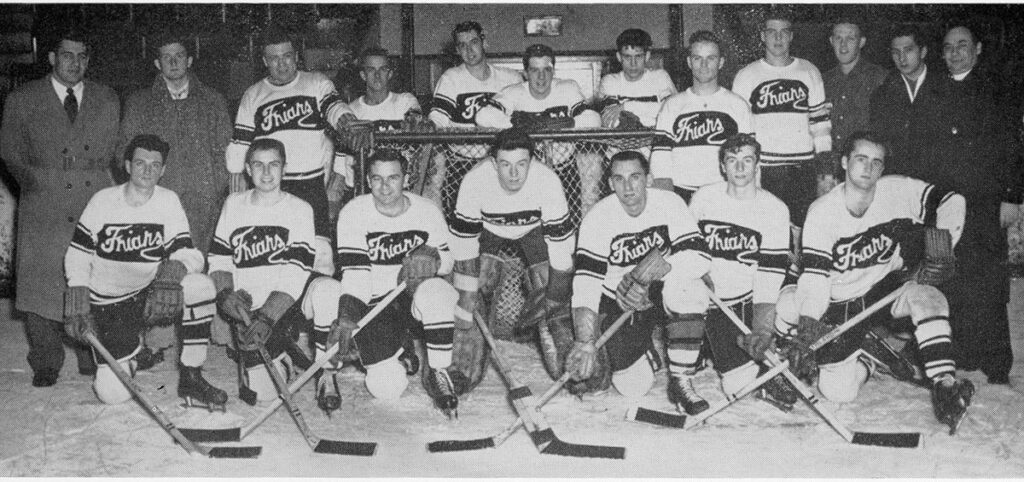
Editor’s Note: When Rhode Island Auditorium opened in 1926, Providence College suited up its first varsity hockey team. Lack of game and practice time, as well as funding, found the Friars frozen out after a single season. Twenty-five years later, Friar fortunes changed forever.
By Ray Farrell ’55
I often wondered what brought us together that day: Was it fate or the daily prayers of Father Herman Schneider, O.P. and his undying wish to have a hockey team at Providence College?
It was early September 1951. My father had a roofing and sheet metal business on Smith Hill. He did all of Bishop Russell McVinney’s diocesan roofing and sheet metal projects. My father and I were sent to a job at the House of the Good Shepherd in Providence, a school for wayward girls that was run by nuns. We worked on what is now PC’s Dominic House.
When we finished the work at hand, one of the nuns asked, “Would it be possible to repaint the cross at the top of the building?”
My father assured the nuns it would be no problem. “I’ll get my son to do it.”
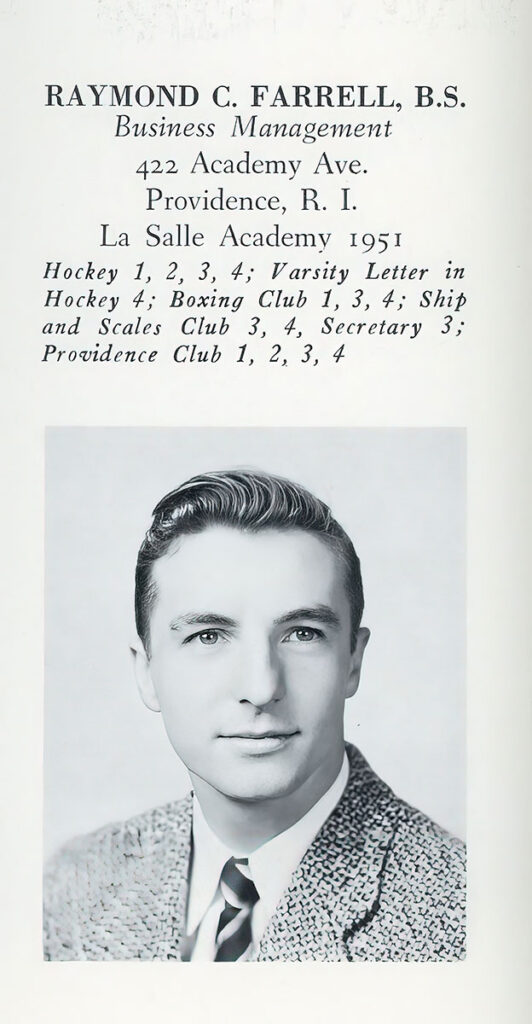
That cross was more than 30 feet up. My dad hooked me up with a safety belt, a rope, and a can of gold paint, and up I went. As I painted, I would look down at all the nuns praying for my safety. When I finished and returned to the veranda the nuns came over to thank me, but one nun in particular asked my name and whether I was still in school.
I told her that I had just graduated from La Salle Academy and was going to wait a year to enroll in the University of Rhode Island.
“Nonsense. You should go to PC,” she said, pointing to the school, which was in view from where we stood.
I said they were already in session.
“You wait right here. I’ll be back,” she said.
She had a piece of paper in her hand when she returned. Written on that sheet was the name Father Charles Fennell. She said, “He is waiting for you in Harkins Hall.”
I tried every excuse to get out of going.
“I’ll be waiting for Father Fennell’s call, so don’t disappoint me,” she said.
So, off I went.
I walked into Harkins Hall and was awestruck by its grand appearance. Father Fennell met me and asked if I had taken an entrance exam.
I told him that I did at URI. He asked me if I wouldn’t mind taking another quick set. No, I said, but is that going to delay my start?
“No, I’ll work that out,” he said. I filled out some papers and took the exam. He reviewed it, smiled, and said, “Let’s go get you some books.”
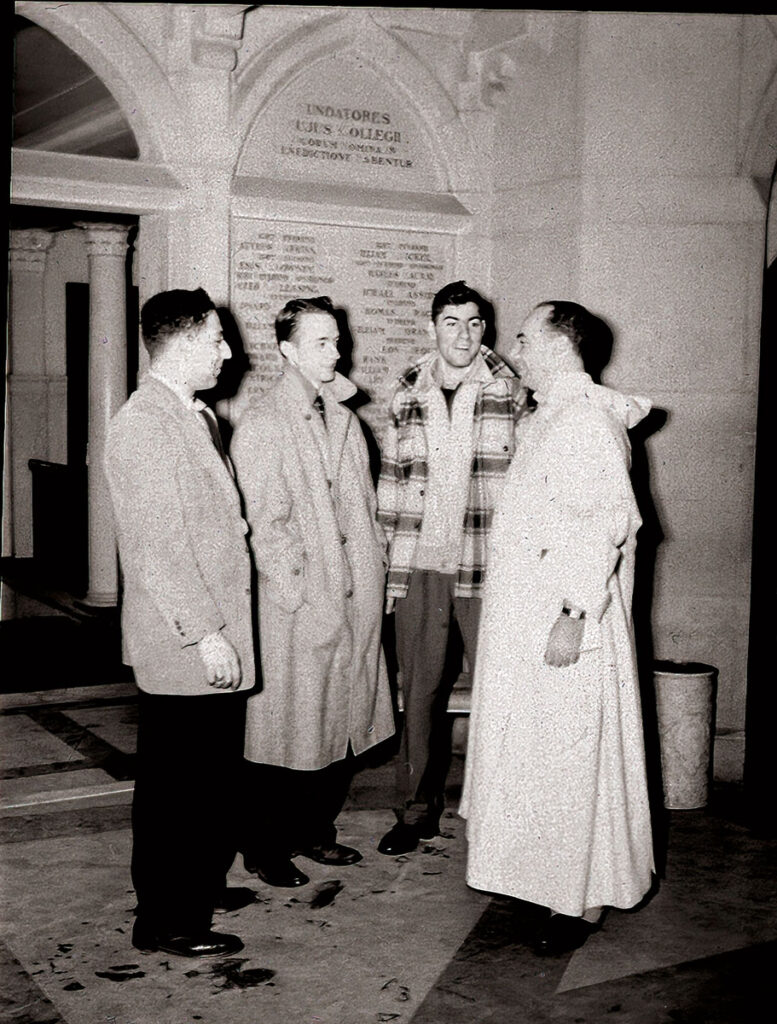
During that process he told me that I was going to take business administration management, taught by professor Gus Coté. My first class was the following morning. My head was spinning. I couldn’t believe what was happening and so fast.
The next morning I was able to find the business administration building and attended my first class with Mr. Coté, who was a big sports fan. My next class was French with George Reilly (I believe a relative of David Reilly ’55, my former hockey teammate at La Salle).
I had trouble locating the classroom. That’s when I frantically walked into a class that I thought was Mr. Reilly’s French class. Instead, it was a German language class. As I was asking other students if I was in the right place, I got a tap on my shoulder, and there stood Father Schneider, the teacher.
I told him I was looking for Reilly’s French class. Kidding, he said, “Why not take both?”
“What’s your name?” he asked.
“Ray Farrell,” I said.
“Where did you go to school?”
“La Salle.”
“Great hockey school. Did you play?”
“Yes.”
“I wish we had a team here at the college.”
“You know, Father, there are enough hockey players from La Salle and other high schools actually attending PC that we could easily start a team.”
“Really? Meet me in the cafeteria at noon.”
At the meeting, I suggested that I would contact the students from La Salle and other schools to see if they had interest in starting a team. Most of the guys happily agreed. I told Father Schneider that there was plenty of interest, but what would the college do to support such a team? He had no idea but would look into the possibilities and get back to me.
I knew that there was a new amateur hockey league starting at the Rhode Island Auditorium and that we could get into it, if we acted quickly. I heard back from Father Schneider, and he told me the best he could do was to supply the jerseys.
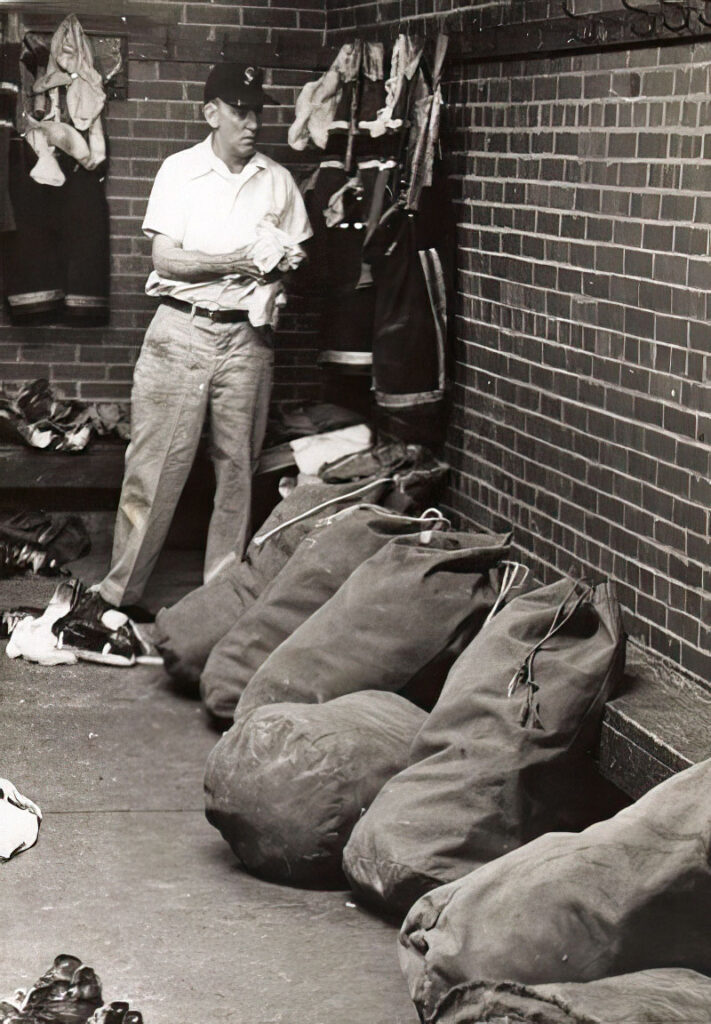
I learned through conversations with some of the guys that the Rhode Island Reds were going to have new uniforms for the upcoming season and there might be a chance to get their old practice uniforms and some equipment. I went over to the Auditorium and met with their trainer, George Army (the father of fellow student Tom Army ’55; grandfather of PC All American and former Friar coach Tim Army ’85 and Boston College All American Bill Army; and great-grandfather of Derek Army ’14).
I asked George Army if there was a way that he could donate any jerseys and equipment that were going to be discarded. He told me that I would have to talk to Lou Pieri, owner of the team. He suggested I go to the front office and ask for him, which I did.
Knock, knock.
“Who’s there?” asked Mr. Pieri.
“Ray Farrell.”
“I don’t know any Ray Farrell. What do you want?”
“I want you to help start a hockey team.”
“I already have a hockey team.”
“I know, but Providence College is trying to start a hockey program and I’m hoping you will donate your team’s old uniforms and some equipment to help us get started.”
“Come in.
“So, how much are you going to pay me for all this?”
“We don’t have any money. Again, I was hoping you would donate it. I am willing to donate the PC team’s time to scrape the ice between periods and after each of the Reds’ games. In return, we’d also like one or two hours of free ice time for our practice sessions. Is it a deal?”
“Yeah, I guess so. Go downstairs and see George.”
What a great man.
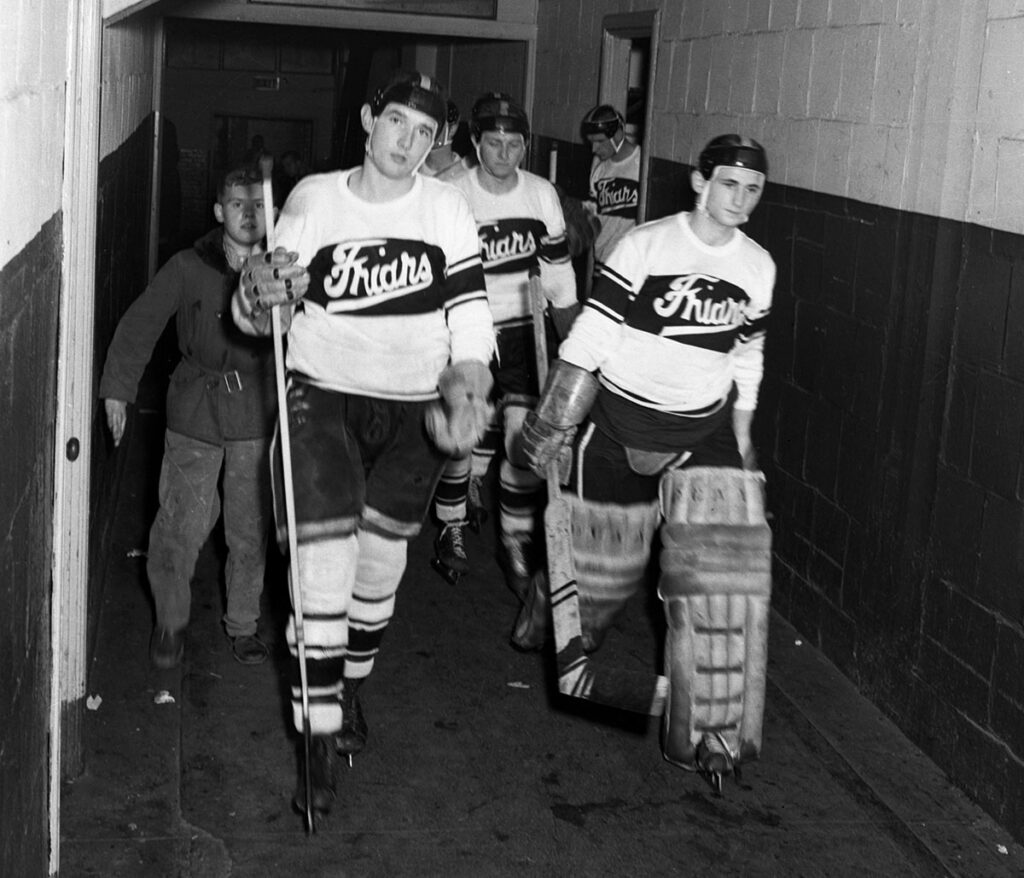
I backed up my father’s 1931 Model A Ford truck, and Mr. Army filled it with all the practice uniforms and pads, plus sticks and pucks. I returned to the PC campus with the loaded truck and headed for the house where Father Schneider and several of the priests lived. I blew the horn (if you know anything about Model A Fords, you know the “Aroo-gah” sound that it makes). It brought Father Schneider out to the porch, and I joyfully yelled out to him, “Father, WE HAVE A HOCKEY TEAM!”
I was able, after a number of tries, to convince my former La Salle hockey coach, Hall of Famer Lou Cimini ’44, to coach us. He knew most of us, of course, and was also a PC alum. He finally relented.
Our club team joined the Rhode Island Amateur Hockey Association and at our first game, quite a few priests and professors were in the stands among the cheering students, including Father Robert Slavin, the college president. It was so great being out on the ice and competing with friends Tom Army, Dave Reilly, Bob Petit ’53, Howie McGuiness ’52, and so many more.
It was a very successful season. We had quickly assembled a team that finished with an 8-2-2 record, tying for the regular season title. With Tom Army leading the league in scoring, it validated the depth of talent we had and promised more success at the varsity level.
With his pledge of unwavering support, there was no greater moment, I’m sure, for Father Schneider, the undisputed founding father of PC hockey. It must have been glorious for him to see that first puck dropped, and a team wearing jerseys with “Friars” emblazoned across the chest playing at the Rhode Island Auditorium. The success we enjoyed was the cherry on top.
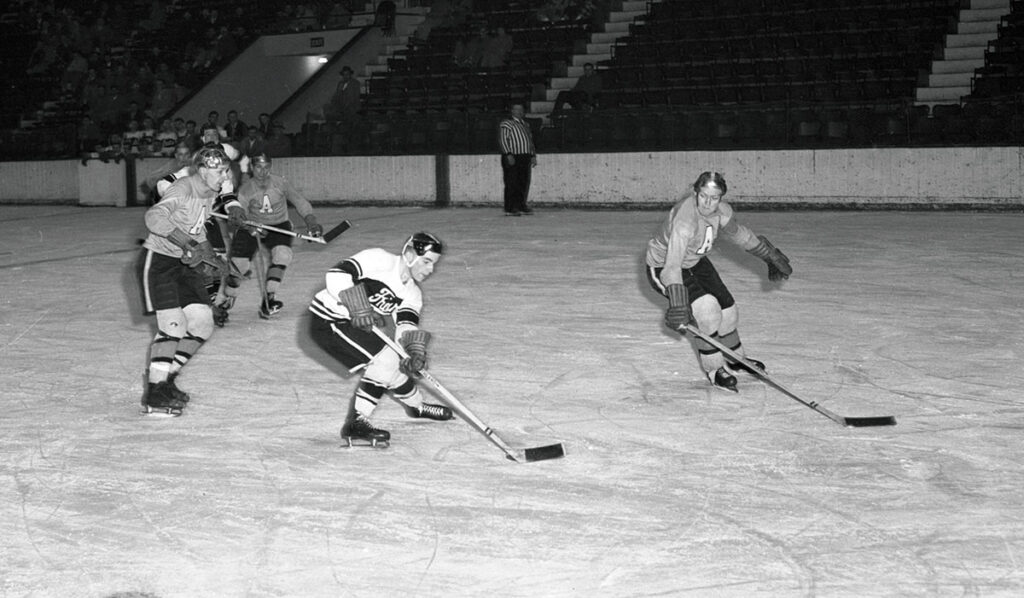
It was his dream, his passion, his prayer that someday it would become a reality, and here it was.
The following season, with much of our club team serving as the nucleus, Providence College suited up a varsity team once again. It was 1952 and our first game was against cross-town rival Brown. Incredibly, just a short dozen years later, our Friars would play for a national title at the Final Four in Colorado Springs — and win it all at the Frozen Four in 2015.
It was Father Schneider’s dream come true … and I was so proud to be there when it all started.
Ray Farrell ’55 of West Palm Beach, Florida, wrote this reflection for the Rhode Island Hockey Hall of Fame website at the invitation of its director and founder, Vin Cimini ’69, cousin of Lou Cimini ’44.
support student athletesThe Fund for Providence College supports the development and success of PC Division I Athletics. Your gift to this fund provides the resources necessary for athletes to thrive in all aspects of their sport.





